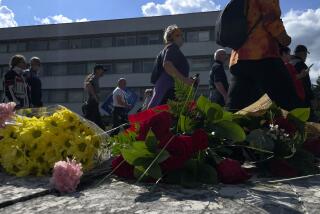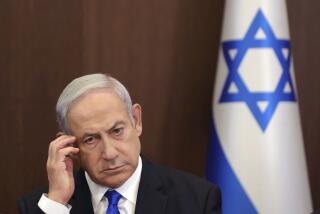Soviet Prime Minister Suffers a Heart Attack : Kremlin: Nikolai I. Ryzhkov is hospitalized, but his life is not threatened, Gorbachev tells Parliament.
- Share via
MOSCOW — Soviet Prime Minister Nikolai I. Ryzhkov, 61, suffered a serious heart attack Tuesday evening, but his life is not in danger, President Mikhail S. Gorbachev said this morning.
Gorbachev told the Congress of People’s Deputies, the Soviet Parliament, that Ryzhkov had been hospitalized but “at this moment his life is out of danger.”
“We wish him well,” Gorbachev said, but gave no further details.
Prime minister for five years, Ryzhkov has been one of Gorbachev’s principal allies, charged with carrying out many of the sweeping political and economic reforms undertaken as part of perestroika.
But in the last six months he has come under increasing pressure to resign as radicals pushed for bigger and faster changes in the state-run Soviet economic system. To them, Ryzhkov had become a symbol of the old apparat that was refusing to move from central planning to a market economy.
Yet Gorbachev was clearly reluctant to replace one of the country’s best managers, a man who had shown intense loyalty to him in the toughest battles over reform. And in a crucial debate over economic policy two months ago he sided with Ryzhkov against the radicals.
On Tuesday, the Congress had approved constitutional amendments abolishing Ryzhkov’s old post, that of chairman of the Council of Ministers, and created a new position of a prime minister heading a Cabinet directly responsible to Gorbachev rather than parliament.
Although presidential aides had said last week that he intended to appoint a different prime minister--that Ryzhkov’s time had come to an end--Gorbachev himself gave no indication in talking with journalists on Tuesday of whom he would name.
Ryzhkov, an engineer by profession, had come to Moscow in 1975 as a deputy minister overseeing the machine tool industry from the giant Uralmash factory in Sverdlovsk.
One of many “Siberians” in the Communist Party and government hierarchy, he rose quickly after the death of President Leonid I. Brezhnev when the first moves were made toward reform.
More to Read
Sign up for Essential California
The most important California stories and recommendations in your inbox every morning.
You may occasionally receive promotional content from the Los Angeles Times.













